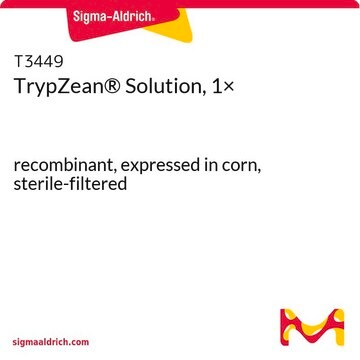T2601
StableCell™ Trypsin Solution
1X, sterile-filtered, BioReagent, suitable for cell culture, 0.5 g porcine trypsin and 0.2 g EDTA, 4Na per liter of Hanks′ Balanced Salt Solution with phenol red
Synonym(s):
Trypsin-EDTA solution
About This Item
Recommended Products
Quality Level
sterility
sterile-filtered
product line
BioReagent
concentration
1X
technique(s)
cell culture | mammalian: suitable
shipped in
wet ice
storage temp.
2-8°C
Looking for similar products? Visit Product Comparison Guide
General description
Application
Biochem/physiol Actions
Features and Benefits
- Save Time - no more freeze or thaw cycles
- Save Space - store at 2-8°C and free up your freezer
- Does not need to be aliquoted
- Only the best for your cells - manufactured in GMP environment
Preparation Note
Storage and Stability
Legal Information
Storage Class Code
12 - Non Combustible Liquids
WGK
WGK 1
Flash Point(F)
Not applicable
Flash Point(C)
Not applicable
Certificates of Analysis (COA)
Search for Certificates of Analysis (COA) by entering the products Lot/Batch Number. Lot and Batch Numbers can be found on a product’s label following the words ‘Lot’ or ‘Batch’.
Already Own This Product?
Find documentation for the products that you have recently purchased in the Document Library.
Customers Also Viewed
Articles
Use of MULTI-seq lipid-modified oligos, protocol, and troubleshooting guide for PCR Assays and Sequencing applications.
Protocols
StableCell™ Trypsin solutions are designed to perform cell detachment as standard trypsin solutions do, without the need to aliquot, freeze, and thaw. This saves significant time before passaging.
Related Content
Discover our primary human intrahepatic biliary epithelial cells, also known as cholangiocytes. Explore our plating and maintenance media formulations and protocol for culture.
Our team of scientists has experience in all areas of research including Life Science, Material Science, Chemical Synthesis, Chromatography, Analytical and many others.
Contact Technical Service






